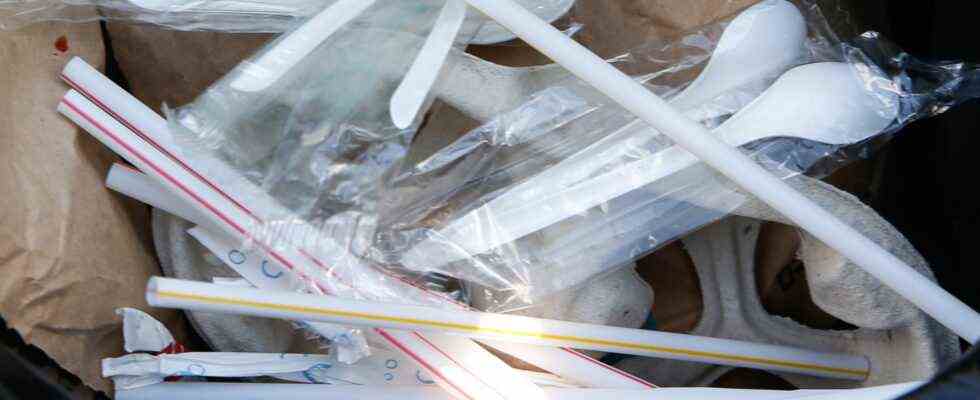FAQ
Status: 03.07.2021 8:42 a.m.
Plastic plates, forks, cotton swabs, straws: As of today, disposable plastic products are no longer allowed to be sold in the EU. What is changing, what is the retail sector saying? The most important questions and answers.
From Claudia Plaß,
ARD capital studio
What is forbidden from today?
Disposable plastic cups, plastic cutlery, drinking straws, cotton swabs, plastic balloon sticks – disposable products like these often end up on beaches or in parks, polluting the oceans and the environment. That is why they should be banned. Fast food packaging and disposable polystyrene containers are also no longer allowed on the market. The same applies to disposable plates, cutlery and cups made of bio-based or biodegradable plastics. Disposable tableware made of cardboard that is covered with plastic should also disappear from the supermarket shelves.
What else is changing?
Other plastic products for which there are no adequate alternatives, such as wet wipes, cigarettes with plastic filters or tampons, are generally allowed. They must now be specially marked with a notice that warns consumers about environmental damage caused by plastic. Information should also be provided about correct disposal.
What is planned in the future?
From 2023 onwards, further steps are planned towards reusable: Then delivery services and restaurants will be obliged to offer reusable containers as an alternative to single-use plastic. From next year on, dealers will no longer be allowed to sell plastic bags, with the exception of so-called shirt bags, thin plastic bags for fruit and vegetables. In addition, a deposit requirement for one-way beverage bottles is to be introduced. From 2025 onwards, there will also be more recycling plastic in one-way drinks bottles. They must contain at least 25 percent so-called recycled material.
What is the federal government hoping for?
Federal Environment Minister Svenja Schulze describes the ban on individual plastic single-use products as an important step out of the throw-away society. According to the ministry in Germany, around 320,000 disposable cups are used for hot drinks every hour, including up to 140,000 to-go cups. The amount of single-use waste has increased in recent years: Between 2015 and 2017 by 3.9 percent to 6.15 million tons. That is what the Federal Environment Agency has calculated.
In order to take action against littering and to save packaging waste, the federal government will in future be relying on reusable alternatives. Basically, says the SPD politician Schulze, care must now be taken that non-single-use plastic is not replaced by other single-use products, for example made of aluminum, but that there are really good alternatives.
How do environmental groups and consumer advocates rate the ban?
Among other things, Deutsche Umwelthilfe is skeptical. Although the ban that is now in force is an important political signal, it is feared that companies can still fall back on other environmentally harmful single-use items. That is why reusable systems for coffee-to-go cups and food boxes should be consistently promoted.
A fee of 20 cents should also be paid on disposable products, demands the DUH, so that there is a steering effect on reusable systems. The reusable systems would in turn have to be financially supported with the income. The Federation of German Consumer Organizations also sees the ban as an important step towards a sustainable consumer society. A ban would only help to a limited extent. Rather, the federal government would have to push through more reusable containers faster than single-use to-go products.
And the trade?
Individual single-use plastic products are now banned. Goods that restaurants or snack chains currently have in stock can still be sold. According to the German trade association, these are no larger quantities. Many retailers have already taken precautions in the past few months to switch to the alternatives, it is said.
Disposable plastic ban – Environment Minister Schulze: An important step
Claudia Plaß, ARD Berlin, July 2nd, 2021 4:04 p.m.

